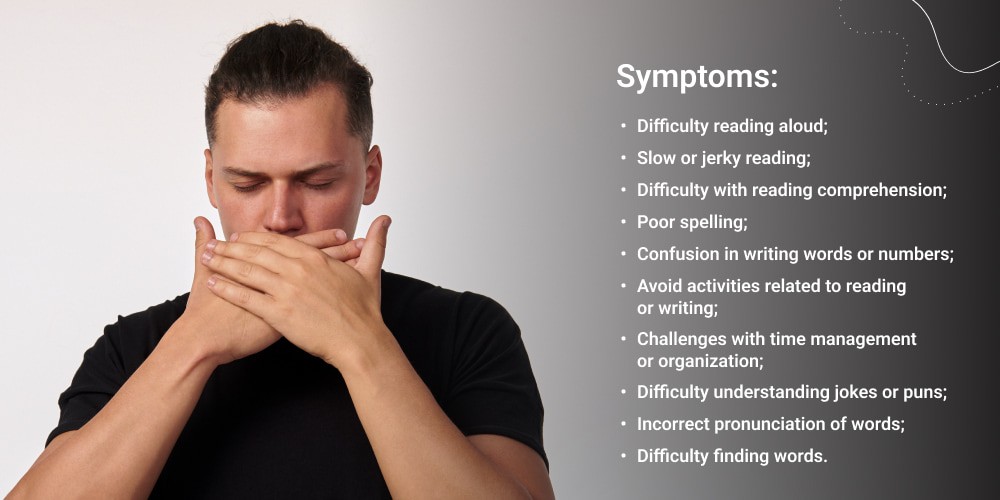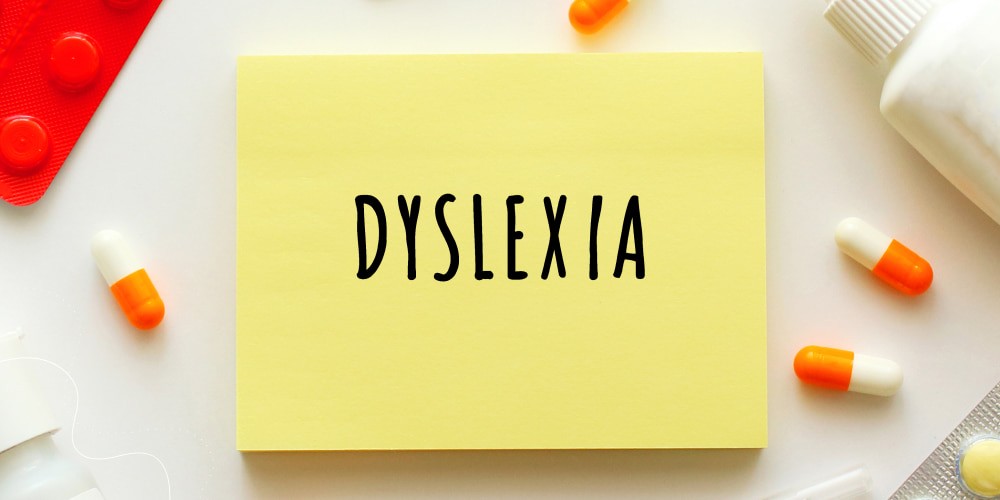Dyslexia is one of the most common problems with learning and mastering a native language. Often, the problem affects reading, spelling, and information processing, occurring to one degree or another in about 10% of the population.
Dyslexia often occurs in conjunction with other conditions, such as attention deficit and hyperactivity disorder, dysgraphia, and dyscalculia. Dyslexia is usually diagnosed in children when a child first goes to school and has difficulty with these skills. But as a lifelong condition, symptoms may persist or first develop in adulthood.
What does dyslexia look like in an adult? What are the first signs, and how to treat them? You can read all of this in detail in our article about dyslexia in adults. Read on and remember!
Dyslexia Symptoms in Adults
Most cases of dyslexia are diagnosed in childhood. But if the problem is not identified and treated early, it can persist into adulthood. The good news is that with the right help, you can treat the signs of adult dyslexia, and people with the problem can learn to read, write, and spell words as well as anyone else.
Dyslexia symptoms in adults may appear differently depending on the severity of the disorder and when it was first diagnosed. However, there are sure signs that may indicate adult dyslexia:
- Difficulty reading aloud.
- Slow or jerky reading.
- Difficulty with reading comprehension.
- Poor spelling.
- Confusion in writing words or numbers.
- Avoid activities related to reading or writing.
- Challenges with time management or organization.
- Difficulty understanding jokes or puns.
- Incorrect pronunciation of words.
- Difficulty finding words.
Even some of the dyslexia symptoms in adults are a reason to go to the doctor and start dealing with the situation. But people should remember to refrain from pressuring patients into doing things they cannot do. A more gentle and measured approach is needed.
Dyslexia Signs in Adults
Dyslexia signs in adults can be divided into three main groups:
- Impaired phonological or verbal processing of information;
- Difficulties with the speed of information processing;
- Problems with short-term memory.
The first group of signs of dyslexia in adults is a phonological or verbal processing disorder. It manifests in characters such as:
- Poor reading aloud;
- Slow and inaccurate reading;
- Difficulty reading comprehension;
- Poor spelling;
- Difficulty using vocabulary;
- Confusion when writing words or numbers.
The second group includes difficulties with the speed of information processing. These are expressed as follows:
- Slowness in performing mental arithmetic operations;
- Slowness in performing administrative tasks (filling out forms, etc.);
- Difficulties in driving (reacting to sudden changes in the road, etc.).
The third group of dyslexia signs in adults is problems with short-term memory. The following signs characterize them:
- Difficulty remembering sequences of numbers or letters;
- Forgetting people’s names;
- Forgetting what was said a few seconds ago;
- Forgetting where one put things;
- Difficulty remembering the series of actions when performing a task.
How Does Dyslexia Affect Adults?
Dyslexia can have a significant impact on an adult‘s life. This disorder can lead to difficulty getting and keeping a job, completing school, and achieving personal goals.
Dyslexia can also affect adult relationships. This problem can cause frustration and conflict with friends, family, and romantic partners.
When people don’t know what dyslexia looks like and don’t suspect they have it, they can become frustrated in many areas. They may even think they are a failure, but the problem is deeper. For example, many adults with dyslexia find that their condition makes it difficult to find jobs matching their skills and abilities. They may be denied promotions or forced into lower-paying jobs. As a result, they may feel they need to reach their full potential.
Adults with dyslexia may have difficulty communicating their needs and feelings. They may also need help understanding what others are saying. This disorder can also cause problems in personal relationships.
Dyslexia can cause frustration and isolation. But with the proper support, adults can recognize what dyslexia looks like and can lead happy and successful lives.
How to Treat Dyslexia in Adults?
When looking for an answer to how to treat dyslexia in adults, the most important thing to understand is that you cannot act on your own. Only a doctor can make the diagnosis!
In some cases, dyslexia can be treated with medication. But this approach has significant limitations and should only be done under the direction of a doctor.
Special exercises are often more effective in treating dyslexia in adults. They help improve reading, writing, and other skills. You can do such therapy either in a group or individually. The main thing is that exercises should be tailored to adults’ individual characteristics of dyslexia.
It is also essential to use special aids and devices to help people with dyslexia in everyday life. For example, some apps can read text aloud or write it down. It can be helpful for people with dyslexia when they need to read a lot of information.
There are also specialized schools and programs that can help adults with dyslexia develop their skills and abilities.
It is essential to understand that dyslexia is a lifelong condition. Therefore, there is no definite answer on how to treat dyslexia in adults. There is supportive therapy, and with the right treatment approach, people with dyslexia can lead happy and successful lives.
When You Should Visit a Doctor
If you suspect you have dyslexia, it is essential to visit a doctor. It is the only way to get an accurate diagnosis. A qualified specialist will be able to prescribe the most effective treatment.
It is essential to understand that dyslexia is a complex disorder that requires a comprehensive approach. Therefore, it is necessary to consult not only with a doctor but also with other specialists. These may be a speech therapist, psychologist, or neurologist.
If you have dyslexia, you should not be ashamed of it. It is a disorder that can be treated effectively. With the right approach, you can achieve great results!
Bottom Line
At our Lone Star Neurology clinic, you can find a qualified specialist who can help you treat dyslexia. We offer a comprehensive approach that includes medication, special exercises, and other therapies.
If you suspect dyslexia or have been diagnosed with this disorder, contact us today to schedule an appointment. We will be happy to help you!
Please remember that dyslexia is a lifelong condition that requires a comprehensive approach. Do not hesitate to contact us if you have questions or need our help!
Thank you for your time! The Lone Star Neurology team.
FAQs
- How to know if you have dyslexia?
The only way to know if you have dyslexia is to visit a qualified specialist. But you can also identify the disease by the symptoms.
- Is dyslexia different in adults?
Dyslexia in adults has the same symptoms as in children. But it can be more challenging to diagnose because of the comorbidities.
- Can an adult suddenly develop dyslexia?
No, dyslexia is a lifelong condition that is diagnosed in childhood. But there is a possibility that it was not diagnosed in childhood.
- Does dyslexia worsen with age?
No, dyslexia does not worsen with age. But if it is not treated, the symptoms can become more pronounced.













Please, leave your review
Write a comment: